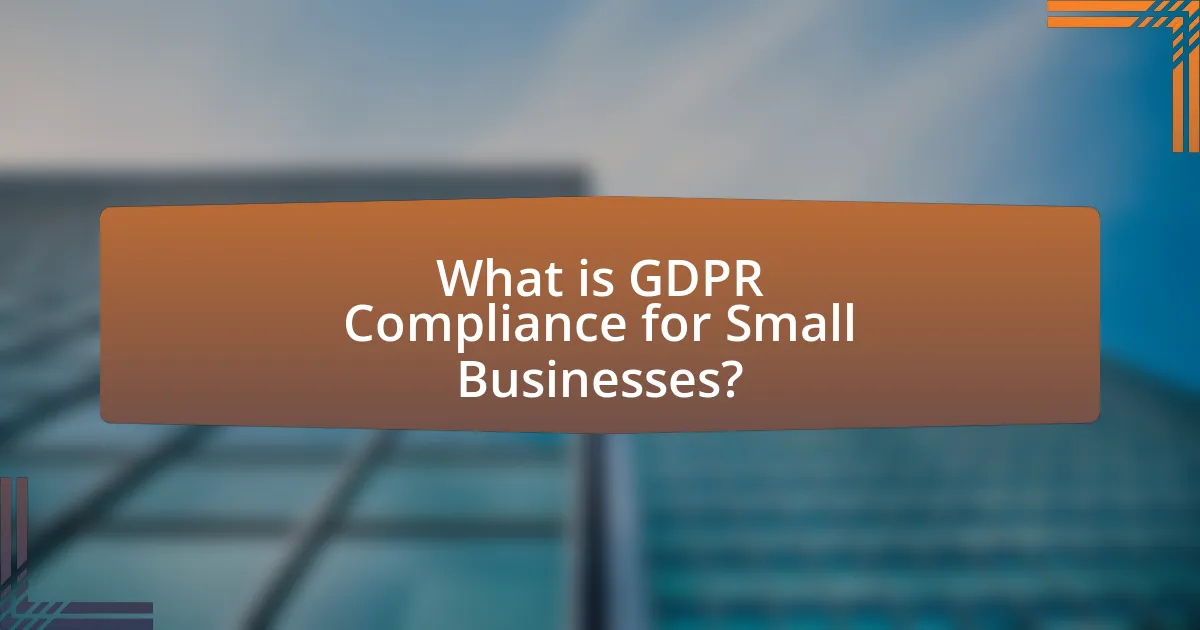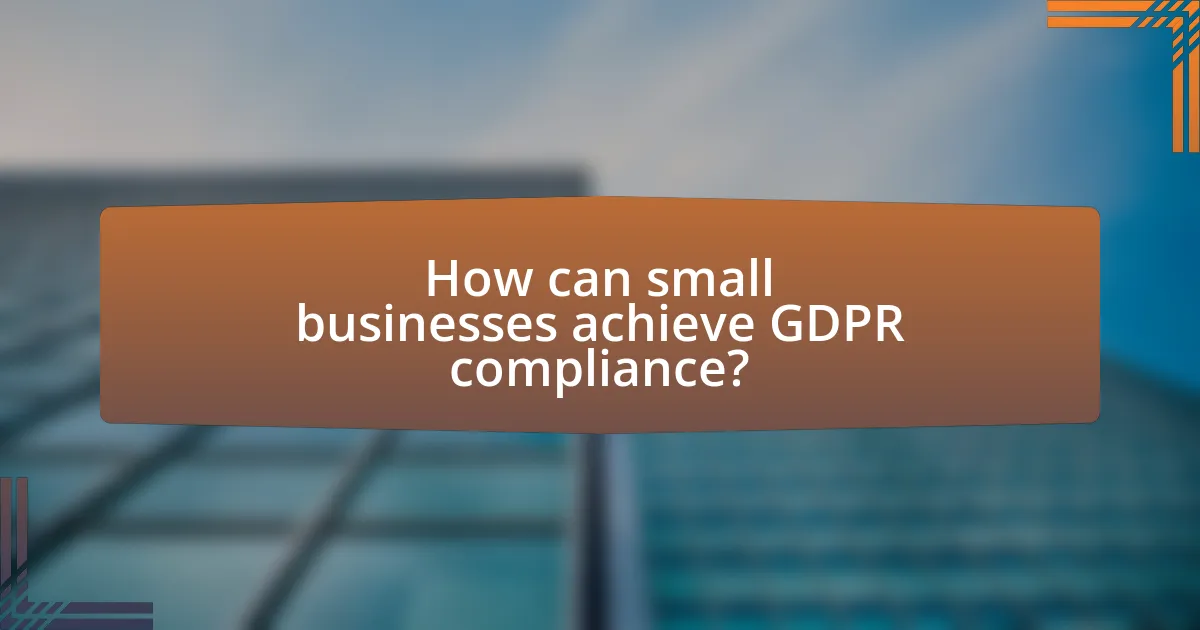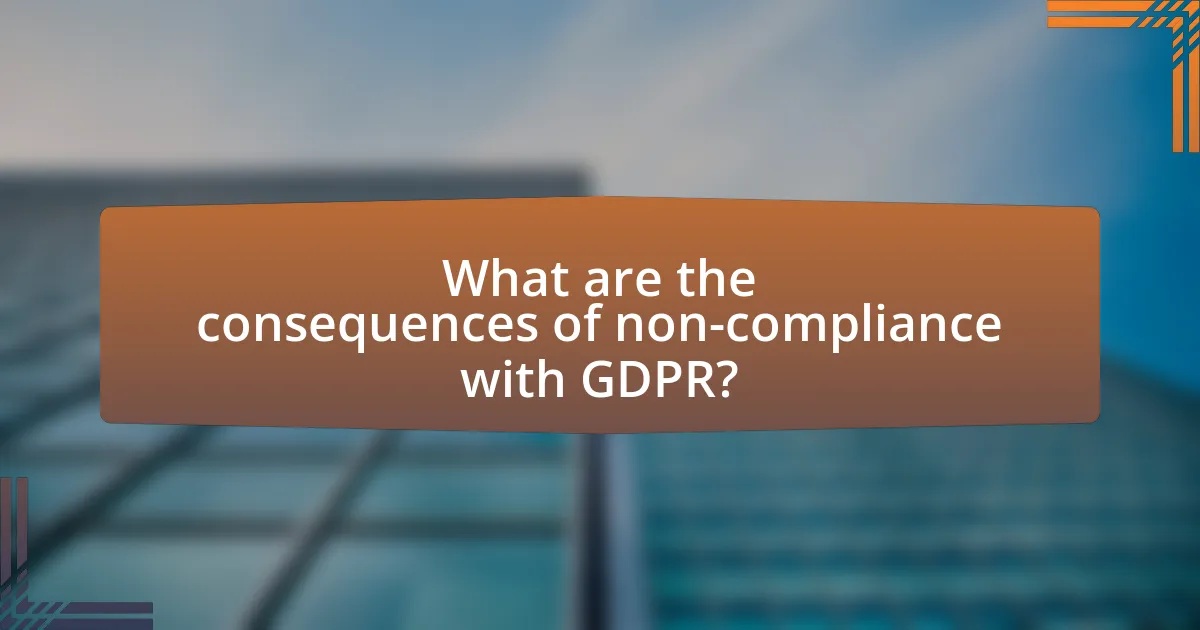GDPR compliance for small businesses involves adhering to the General Data Protection Regulation, which governs the handling of personal data of EU citizens. This article outlines the significance of GDPR for small enterprises, emphasizing the need for explicit consent, data security, and the rights of individuals regarding their data. Key principles of GDPR, such as lawfulness, data minimization, and accountability, are discussed, along with the impact of non-compliance, which can lead to substantial fines and reputational damage. Additionally, the article provides practical steps for achieving compliance, including conducting data audits, appointing a Data Protection Officer, and utilizing available tools and resources.

What is GDPR Compliance for Small Businesses?
GDPR compliance for small businesses refers to the adherence to the General Data Protection Regulation, which mandates how personal data of EU citizens must be handled. Small businesses must implement measures to ensure the protection of personal data, including obtaining explicit consent for data collection, ensuring data security, and providing individuals with rights to access and delete their data. Non-compliance can result in significant fines, up to 4% of annual global turnover or €20 million, whichever is higher, emphasizing the importance of understanding and implementing GDPR requirements effectively.
Why is GDPR important for small businesses?
GDPR is important for small businesses because it establishes a framework for data protection that enhances consumer trust and ensures compliance with legal standards. Small businesses that adhere to GDPR can avoid significant fines, which can reach up to 4% of annual global turnover or €20 million, whichever is higher. This regulation not only protects customer data but also fosters a competitive advantage by demonstrating a commitment to privacy, which is increasingly valued by consumers. Furthermore, non-compliance can lead to reputational damage, making it crucial for small businesses to implement GDPR practices to safeguard their operations and customer relationships.
What are the key principles of GDPR that small businesses must follow?
The key principles of GDPR that small businesses must follow include lawfulness, fairness, and transparency; purpose limitation; data minimization; accuracy; storage limitation; integrity and confidentiality; and accountability. Lawfulness requires that personal data be processed legally and fairly, ensuring individuals are informed about how their data is used. Purpose limitation mandates that data is collected for specified, legitimate purposes and not further processed in a manner incompatible with those purposes. Data minimization emphasizes that only the necessary data for the intended purpose should be collected. Accuracy ensures that personal data is kept up to date and corrected when necessary. Storage limitation requires that data is retained only for as long as necessary for the purposes for which it was processed. Integrity and confidentiality mandate that personal data is processed securely to prevent unauthorized access or loss. Finally, accountability obligates businesses to demonstrate compliance with these principles. These principles are outlined in the GDPR text, which applies to all organizations processing personal data within the EU, including small businesses.
How does GDPR impact data handling practices in small businesses?
GDPR significantly impacts data handling practices in small businesses by imposing strict regulations on how personal data is collected, processed, and stored. Small businesses must ensure they obtain explicit consent from individuals before processing their data, which requires clear communication about the purpose of data collection. Additionally, they are mandated to implement appropriate security measures to protect personal data, conduct regular data audits, and maintain detailed records of data processing activities. Non-compliance can result in substantial fines, with penalties reaching up to 4% of annual global turnover or €20 million, whichever is higher, emphasizing the importance of adherence to these regulations for small businesses.
What are the main requirements for GDPR compliance?
The main requirements for GDPR compliance include obtaining explicit consent from individuals for data processing, ensuring the right to access personal data, implementing data protection by design and by default, and notifying authorities and affected individuals in the event of a data breach. Organizations must also appoint a Data Protection Officer if they process large amounts of personal data or sensitive data. These requirements are established to protect individuals’ privacy rights and ensure transparency in data handling practices.
What types of personal data are covered under GDPR?
The General Data Protection Regulation (GDPR) covers various types of personal data, including any information that relates to an identified or identifiable individual. This encompasses names, identification numbers, location data, online identifiers, and specific characteristics that can identify a person, such as physical, physiological, genetic, mental, economic, cultural, or social identity. The regulation explicitly defines personal data as any data that can be used to directly or indirectly identify a person, reinforcing the importance of protecting such information under EU law.
How should small businesses obtain consent for data processing?
Small businesses should obtain consent for data processing by providing clear, concise information about the data being collected and the purpose of its use. This involves presenting a straightforward consent form that outlines what data will be processed, how it will be used, and the rights of the individuals regarding their data. According to the General Data Protection Regulation (GDPR), consent must be freely given, specific, informed, and unambiguous, which means that businesses must ensure that individuals can easily understand what they are consenting to. Additionally, businesses should implement mechanisms for individuals to withdraw consent at any time, reinforcing the importance of user control over personal data.

How can small businesses achieve GDPR compliance?
Small businesses can achieve GDPR compliance by implementing data protection policies, conducting regular audits, and ensuring transparency in data processing. First, they should appoint a Data Protection Officer (DPO) or designate a responsible individual to oversee compliance efforts. Next, businesses must conduct a data inventory to identify what personal data they collect, how it is used, and where it is stored. This inventory helps in assessing risks and ensuring that data processing activities align with GDPR principles.
Additionally, small businesses should develop clear privacy notices that inform customers about their data rights and how their data will be used. Training employees on data protection practices is also crucial to ensure that everyone understands their responsibilities under GDPR. Furthermore, businesses must establish procedures for handling data breaches, including notifying authorities and affected individuals within the required timeframe.
According to the Information Commissioner’s Office (ICO), organizations must also ensure that they have a lawful basis for processing personal data, which can include consent, contractual necessity, or legitimate interests. By following these steps, small businesses can effectively navigate the complexities of GDPR compliance.
What steps should small businesses take to ensure compliance?
Small businesses should take the following steps to ensure compliance with GDPR: conduct a data audit, implement data protection policies, appoint a Data Protection Officer (DPO) if necessary, ensure transparency with customers, and provide training for employees. Conducting a data audit helps identify what personal data is collected, processed, and stored, which is essential for compliance. Implementing data protection policies establishes clear guidelines for handling personal data, while appointing a DPO ensures there is a dedicated individual responsible for overseeing compliance efforts. Transparency with customers involves informing them about data collection practices and their rights under GDPR. Finally, providing training for employees ensures that all staff members understand their responsibilities regarding data protection, which is crucial for maintaining compliance.
How can small businesses conduct a data audit?
Small businesses can conduct a data audit by systematically reviewing their data collection, storage, and processing practices to ensure compliance with GDPR regulations. This process involves identifying all data sources, categorizing the types of personal data collected, and assessing how this data is used and shared. Additionally, businesses should evaluate their data retention policies and ensure that they have appropriate consent mechanisms in place for data processing. According to the Information Commissioner’s Office (ICO), conducting regular audits helps organizations identify potential risks and ensure that they are meeting their legal obligations under GDPR.
What role does appointing a Data Protection Officer play for small businesses?
Appointing a Data Protection Officer (DPO) plays a crucial role in ensuring that small businesses comply with data protection regulations, particularly the General Data Protection Regulation (GDPR). The DPO is responsible for overseeing data protection strategies, ensuring that the business processes personal data in compliance with legal requirements, and serving as a point of contact for data subjects and regulatory authorities.
Research indicates that businesses with a designated DPO are better equipped to manage data breaches and mitigate risks associated with non-compliance, which can lead to significant fines; under GDPR, fines can reach up to 4% of annual global turnover or €20 million, whichever is higher. Furthermore, having a DPO can enhance customer trust, as it demonstrates a commitment to protecting personal data and privacy.
What tools and resources are available for small businesses?
Small businesses can access various tools and resources to aid in GDPR compliance, including software solutions, legal guidance, and training programs. Tools such as data protection management software help businesses track and manage personal data, ensuring compliance with GDPR requirements. Resources like the Information Commissioner’s Office (ICO) provide comprehensive guidelines and templates for data protection policies. Additionally, online training platforms offer courses specifically designed to educate employees about GDPR principles and practices. These resources collectively support small businesses in navigating the complexities of GDPR compliance effectively.
What software solutions can assist with GDPR compliance?
Software solutions that can assist with GDPR compliance include OneTrust, TrustArc, and DataGrail. OneTrust provides tools for data mapping, consent management, and privacy impact assessments, which are essential for meeting GDPR requirements. TrustArc offers a comprehensive privacy management platform that helps organizations manage compliance through assessments, reporting, and risk management features. DataGrail focuses on data discovery and privacy rights management, enabling businesses to automate requests related to personal data access and deletion. These solutions are designed to streamline compliance processes and ensure adherence to GDPR regulations effectively.
How can small businesses access training and support for GDPR?
Small businesses can access training and support for GDPR through various resources such as online courses, workshops, and consultancy services. Organizations like the Information Commissioner’s Office (ICO) in the UK provide free online resources, including guides and webinars specifically designed for small businesses to understand GDPR requirements. Additionally, industry associations often offer tailored training programs and support networks to help small businesses navigate compliance. According to a survey by the European Commission, 60% of small businesses reported using external consultants for GDPR compliance, highlighting the importance of seeking expert assistance.

What are the consequences of non-compliance with GDPR?
Non-compliance with GDPR can result in significant financial penalties, with fines reaching up to 4% of a company’s annual global turnover or €20 million, whichever is higher. This regulatory framework is enforced by data protection authorities across the European Union, which have the authority to impose these fines based on the severity of the violation. Additionally, non-compliance can lead to reputational damage, loss of customer trust, and potential legal actions from affected individuals or entities. These consequences underscore the importance of adhering to GDPR regulations for businesses operating within or interacting with the EU market.
What penalties can small businesses face for GDPR violations?
Small businesses can face significant penalties for GDPR violations, including fines of up to €20 million or 4% of their annual global turnover, whichever is higher. The European Data Protection Board emphasizes that these penalties are tiered based on the severity of the violation, with less severe infringements potentially resulting in lower fines. For instance, failure to comply with data subject rights can lead to fines of up to €10 million or 2% of annual global turnover. Additionally, small businesses may incur reputational damage and legal costs associated with compliance investigations and potential lawsuits, further impacting their operations and financial stability.
How do fines differ based on the severity of the violation?
Fines under the General Data Protection Regulation (GDPR) vary significantly based on the severity of the violation. Minor violations may incur fines of up to €10 million or 2% of the annual global turnover, whichever is higher, while more severe violations can lead to fines of up to €20 million or 4% of the annual global turnover. This tiered approach reflects the seriousness of the infringement, with factors such as intent, duration, and the number of affected individuals influencing the final penalty. For example, a data breach resulting from negligence may attract a lower fine compared to a deliberate violation of data subjects’ rights.
What are the reputational risks associated with non-compliance?
Non-compliance with GDPR can lead to significant reputational risks for small businesses, including loss of customer trust and negative public perception. When a business fails to protect personal data, it can face backlash from consumers who prioritize data privacy, resulting in decreased customer loyalty. A study by the Ponemon Institute found that 75% of consumers would stop purchasing from a company that experienced a data breach. Additionally, media coverage of non-compliance incidents can amplify reputational damage, as negative stories can spread quickly, affecting public perception and brand image. This erosion of trust can ultimately lead to reduced sales and long-term financial consequences for the business.
How can non-compliance affect customer trust and business relationships?
Non-compliance with regulations like GDPR can significantly erode customer trust and damage business relationships. When businesses fail to adhere to compliance standards, customers may perceive them as untrustworthy, leading to a loss of confidence in the company’s ability to protect their personal data. For instance, a study by the Ponemon Institute found that 75% of consumers would stop doing business with a company that experienced a data breach due to non-compliance. This decline in trust can result in decreased customer loyalty, negative word-of-mouth, and ultimately, a reduction in revenue. Furthermore, non-compliance can lead to legal repercussions, including fines and sanctions, which can further strain business relationships and hinder growth opportunities.
What best practices can small businesses implement for ongoing compliance?
Small businesses can implement several best practices for ongoing compliance with GDPR, including conducting regular data audits, maintaining clear documentation of data processing activities, and providing employee training on data protection principles. Regular data audits help identify and mitigate risks associated with personal data handling, ensuring that businesses remain aware of their compliance status. Documentation of data processing activities is essential for demonstrating accountability and transparency, as required by GDPR Article 30. Furthermore, training employees fosters a culture of compliance and equips staff with the knowledge to handle personal data responsibly, reducing the likelihood of breaches. These practices collectively support small businesses in maintaining adherence to GDPR regulations.
How can small businesses stay updated on GDPR regulations?
Small businesses can stay updated on GDPR regulations by regularly consulting official resources such as the European Commission’s website and the Information Commissioner’s Office (ICO) in the UK. These platforms provide the latest updates, guidelines, and best practices related to GDPR compliance. Additionally, subscribing to newsletters from legal firms specializing in data protection and attending webinars or workshops focused on GDPR can enhance understanding and awareness of any changes in the regulations. Regularly reviewing industry publications and participating in relevant professional networks also helps small businesses remain informed about GDPR developments.
What regular assessments should small businesses conduct to maintain compliance?
Small businesses should conduct regular data protection impact assessments (DPIAs), audits of data processing activities, and employee training sessions to maintain compliance with GDPR. DPIAs help identify and mitigate risks associated with data processing, ensuring that personal data is handled responsibly. Regular audits of data processing activities allow businesses to verify that they are adhering to GDPR principles, such as data minimization and purpose limitation. Additionally, ongoing employee training ensures that staff are aware of their responsibilities regarding data protection and the importance of compliance, which is crucial given that human error is a common cause of data breaches.
